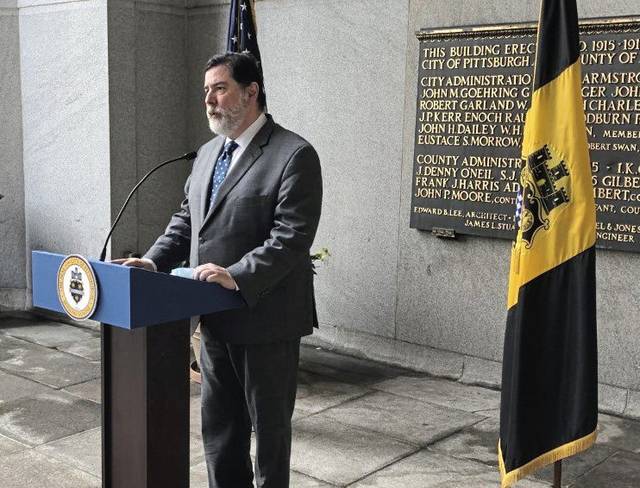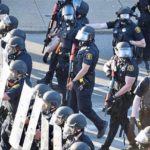Pittsburgh Mayor Bill Peduto during a call for police reform Thursday morning said there are indications that police commanders did not give the go-ahead for using tear gas to disperse protesters during a Monday night protest in East Liberty.
The hourslong march for racial justice began to break up around 7 p.m., according to police, at which point a group broke off and allegedly began smashing windows, starting fires and throwing rocks at police.
“At that point, the lieutenant on duty requests the use of gas and that request apparently (was) denied by command staff,” Peduto said.
He emphasized “apparently,” noting that the transmissions are in police code and “I haven’t had a chance to sit down with the chief and Public Safety director.”
Public Safety officials could not be reached for comment.
“Before that, there is no request for gas and there are specific orders to use smoke,” he said.
City and police officials – including Peduto – initially said at a press conference late Monday that only smoke was used to disperse the crowd, though the official Public Safety Twitter account had tweeted over the course of the dispersal that police had deployed gas. The bureau confirmed the next day that gas had been used.
“We used the best available information in order to be able to present what our findings were,” Peduto said of Monday night’s news conference. “They were wrong.”
Public Safety officials clarified Tuesday that gas was used only after they said officers had been pelted with rocks and bottles, specifically noting that only smoke was used on the crowd at the intersection of Centre and Negley avenues.
Peduto said some videos taken by the public might show that isn’t the case.
“There is video from the public of people reacting the way you would react to tear gas,” he said. “The way that they are reacting is not an indication of smoke.”
The diverging recounts of Monday night’s events, he said, are why he asked the Office of Municipal Investigations and the Citizen Police Review Board to investigate.
“I saw video that makes it seem to me that it was (gas). I read documents that said that it wasn’t,” he said. “Even if they did (use gas), that was not the information that was provided on Monday evening.”
Thursday’s news conference was called so city leaders could outline their push for policing reforms at both the state and local levels, including a call for limiting the power of union arbitrators under Pennsylvania’s Act 111 to overturn the disciplining and firing of officers.
“Currently under Pennsylvania law, city leaders can fire or otherwise discipline police officers for misbehavior only to have the discipline overturned by arbitrators, and officers can only be decertified for misconduct if they are found guilty of criminal charges,” said Dan Gilman, Peduto’s Chief of Staff.
Gilman and Peduto called for the state to amend laws to let city leaders challenge an arbitrator’s decision to reinstate an officer if it would be “adverse to the public interest,” as well as just generally expand the circumstances under which officers can be fired.
Robert Swartzwelder, president of Fraternal Order of Police Fort Pitt Lodge 1, said Act 111 gives police officers and firefighters a right to due process, including hearings, in disciplinary proceedings and said any modification would be “patently unfair” and a violation of the U.S. Constitution. He said the law was a compromise between unions and government that provides arbitration to prevent strikes.
“He wants to terminate officers without any due process,” Swartzwelder said.
Peduto told state legislators that now is the time to step up and let police reform bills make it to a vote.
“That vote would be an embarrassment to the state of Pennsylvania if it fell along racial lines,” he said. “I am calling on every other white elected official to support and back and sponsor these bills.”
He reiterated his support for legislation introduced by state Reps. Summer Lee and Ed Gainey that would disallow police use of deadly force during arrests and limit its use to “protect against imminent threats of harm.”
Swartzwelder said officials are “politicizing” the death of George Floyd by seeking such reforms.
“For example, if you adopt that legislation and you have a school shooter and the school shooter is fleeing to go to another location, you can’t fire,” he said, adding that the actions of the Minneapolis officers in Floyd’s death violated numerous restraint policies used by police.
“People are losing sight of the death of this individual … and the social discussion that we’re having right now,” he said. “They’re using it as a platform to make their own gains and people are forgetting about what really is occurring and why people are protesting.”
The city’s calls for reform at the state level include:
• Amending Act 111 – the police and fire collective bargaining act – to limit the scope of bargaining over disciplinary procedures or specifically limit a labor arbitrator’s authority to modify disciplinary penalties.
• Amending the same act to adopt what is called the “public policy exception,” which allows cities to challenge an arbitrator’s decision to return an officer to work.
• Amending the Confidence in Police Act – a law governing procedures surrounding firing an officer – to expand those circumstances under which employers are required to fire officers.
• Giving the Municipal Police Officers’ Education and Training Commission more leeway in revoking certifications and reviewing use-of-force complaints.
City leaders also pledged to uphold the “8 Can’t Wait” campaign, which outlines procedures meant to avoid deadly force. Gilman noted that many of the recommendations already are Pittsburgh police policy. Swartzwelder, a police training instructor, said he wrote 8 Can’t Wait curriculum for Pittsburgh police and it’s been adopted statewide.
“We do 99% of them, and maybe not in the form that’s described there, but if you really look closely at our deadly force policy, our use of force policy, our stop and frisk policy, our less-lethal policy, our pursuit policy, all of that’s covered,” he said.
The campaign asks officers and departments to:
• De-escalate situations when possible before using force.
• Have a use-of-force continuum that defines what force can be used for specific types of resistance.
• Limit chokeholds and strangleholds to situations where deadly force is authorized.
• Give a verbal warning when possible before using deadly force.
• Limit shooting at moving vehicles to when the individual is a deadly threat for reasons other than the car – for example, if the individual is shooting at people from in the car.
• Exhaust all reasonable alternatives before using deadly force.
• Require officers to intervene if a fellow officer is using excessive force.
• Require officers to report all uses of force – including threatening someone with a firearm.













